COVID-19

Black Women Appellate Judicial Nominations, Vaccine Disparities Among Older Americans & More: May 13 Joint Center Roundup
Biden Administration

Declining a job could lead to loss of benefits: Earlier this week, President Biden said “[w]e’re going to make it clear that anyone who is collecting unemployment who is offered a suitable job must take the job or lose their unemployment benefits,” and added that the stipulation would include “a few COVID-19-related exceptions.” However, Black workers have been reticent about returning to work for a myriad of reasons, chief among them the disproportionate impact of COVID on Black communities, disproportionately low wages, and caregiving responsibilities. Recent Pew data shows that “four-in-ten Black adults live in households that have lost jobs or wages since the start of the coronavirus outbreak” and “one-in-four Black adults with some college experience or less worry about losing their job or taking a cut in pay (each 25%) – higher shares than among Black adults with a college degree (13% and 11%).”
Biden’s plan for the American workforce: President Biden shared an overview of “additional steps to help Americans return to work,” including providing “funding to address the child care crisis caused by COVID-19 to help parents who need or want to work to return to their jobs” (via the American Rescue Plan), “directing the Secretary of Labor to safely expand states’ Reemployment Services and Workforce Development Boards’ jobs counseling for unemployment beneficiaries,” sending grants to businesses hit hard by the pandemic, and more.
Measuring racial equity in vaccine rates among 65+: President Biden said there’s “virtually no difference between white, Black, Hispanic, [and] Asian American” people regarding disparities for Americans who are 65 years and older and received the vaccine. However, the underlying data supporting this assertion was not publicly disclosed by the White House, and Center for Disease Control (CDC) Spokesperson Chandra Zeikel told Kaiser Health News-PolitiFact that they “don’t have available a data breakdown of both racial demographics and age together.” As KHN-PolitiFact notes, “[f]or the few states that do report data on age and race/ethnicity combined, the numbers suggest that, for the most part, obvious disparities persist in the vaccination rates for white seniors and seniors of color. Existing data paints one story on vaccine equity, while Biden’s words paint another.”
Vaccine hotline: As many Americans don’t have broadband access or prefer using the telephone, President Biden launched a “vaccine hotline” (1-800-232-0233) to help them learn about nearby locations offering the COVID-19 vaccine.
The Hill
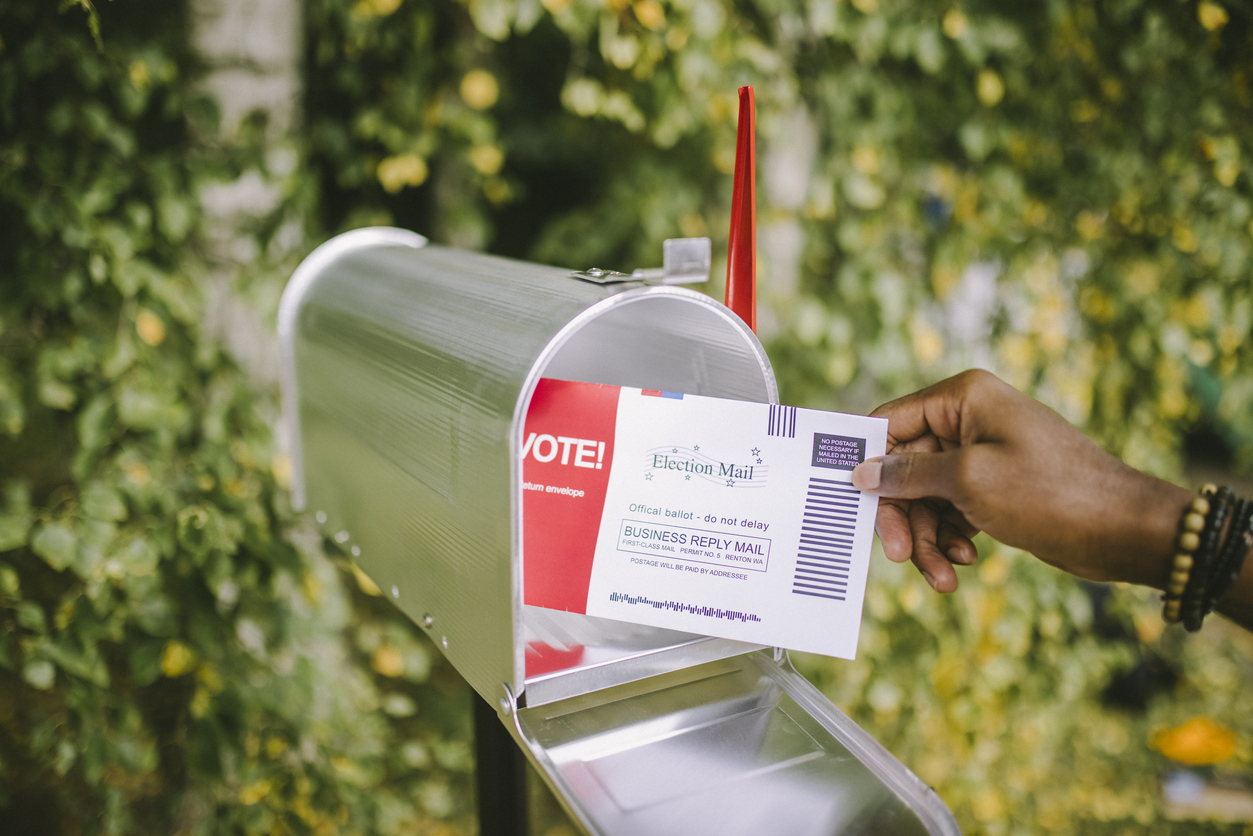
A divided elections bill: The Senate Rules Committee met on Tuesday to discuss the For People Act, an elections bill that is “divided among party lines.” This bill would require states to offer mail-in ballots, enact 15 days of early vote opportunities, and allow for online and same-day voter registration (full summary here). Republicans believe the bill tampers with election security and have filed almost 150 amendments to weaken its provisions. Democrats are “all united” and argue that the For the People Act is “crucial to stem any efforts to try to limit voting.”
A bipartisan approach to infrastructure: Republicans signaled their approval of an infrastructure bill that is as much as $800 billion. President Biden will meet with Democrats and Republicans this week to discuss his proposed infrastructure bill and identify “common ground on which they can work together and deliver results on the challenges facing American families.” Republicans are ready to get to work, but are only open to paying for a package that takes on “more traditional measures like increasing the gas tax.”
Consideration for a BIPOC Caucus in the Senate: Interest in the formal creation of a BIPOC Caucus (Black, Indigenous, and People of Color) is ruminating ahead of the Asian Pacific American Heritage Month Unity Summit as Senators Booker (D-NJ), Hirono (D-HI), Duckworth (D-IL), Warnock (D-GA), Padilla (D-CA) Cortez (D-NV), Luján (D-NM), and Menendez (D-NJ) continue to unite around and seek justice on various legislative issues such as “voting rights, immigration, and health disparities.”
The fight for Black maternal justice: Several members of the Congressional Black Caucus attended the House Committee on Oversight and Reform hearing, “Birthing While Black: America’s Black Maternal Health Crisis.” The event explored Black maternal mortality and morbidity through testimony by Black women, men, and their families. Congressional Black Caucus Members Congresswoman Lauren Underwood (D-IL), Congresswoman Alma Adams (D-NC), and Congresswoman Ayanna Pressley (D-MA) crafted several bills amplifying Black maternal health and are pushing a legislative package called the Black Maternal Health Momnibus Act. Senator Booker (D-NJ) and Congresswoman Ayana Pressley (D-MA) also introduced the Maximizing Outcomes for Moms through Medicaid Improvement and Enhancement of Service (MOMMIES) Act (summary here) to continue the fight for maternal justice.
Lawmakers remain unresolved on police reform legislation: Police reform and qualified immunity remain a “key point of contention” between Democrats and Republicans as President Biden’s May 25 deadline approaches. To initiate progress, the Justice Department offers suggestions to add “language to any new law that would enhance federal prosecutors’ ability to bring cases against officers.” Senator Raphael Warnock (D-GA) argues any final bill needs to provide reassurance to Black communities during interactions with police given the successions of “deadly incidents that have galvanized the racial justice movement.” As it stands, there is some bipartisan agreement on federal standards for no-knock warrants, banning chokeholds, and setting limitations on military equipment used by the Department of Defense to local and state police departments.
Community-based workforce program receives applause: The U.S. Department of Health and Human Services will invest $250 million to develop “a community-based workforce to serve as trusted messengers to deliver public health information, increase vaccine confidence, and address barriers to vaccination for vulnerable and medically underserved communities.” Congresswoman Barbara Lee (D-CA)—who proposed the COVID Community Care Act legislation with Senator Elizabeth Warren (D-MA) to do the same—applauded the Department.
Appointments

Biden nominates Eunice C. Lee for the United States Court of Appeals for the Second Circuit. Ms. Lee is an Assistant Federal Defender with the Federal Defenders of New York. Before joining the Federal Defenders, Ms. Lee worked from 1998 to 2019 with the Office of the Appellate Defender in New York City. She joined the office as a Staff Attorney and was named Supervising Attorney in 2001. If appointed, Ms. Lee would be “the second African American woman ever to serve on the United States Court of Appeals for the Second Circuit” and “the only judge with experience as a federal defender serving on that circuit.” Of Biden’s six Court of Appeals nominees so far, four are African American women. In February, the Joint Center published a piece urging President Biden to prioritize nominating Black judges to the U.S. Court of Appeals (0 of Trump’s 54 appellate court nominees were Black).
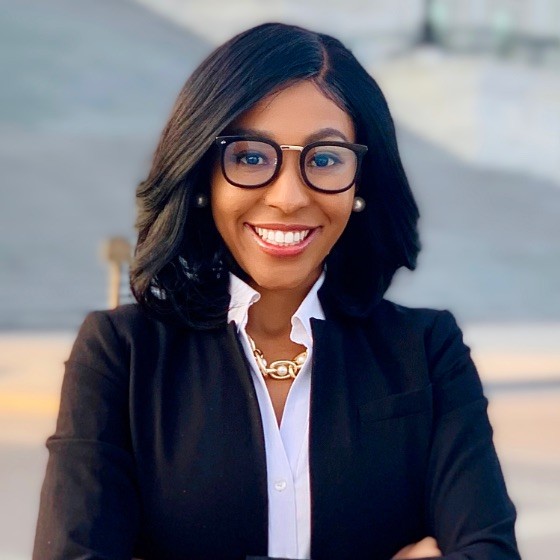
Biden appoints Erica P. Loewe as Director of African American Media at the White House. Ms. Loewe previously served as the Deputy Communications Director for U.S. House Majority Whip James E. Clyburn. She also served as the Deputy Communications Director for the House Financial Services Committee.

Biden appoints Chidi Blyden as Deputy Assistant Secretary of Defense for African Affairs at the Department of Defense. Ms. Blyden is an adjunct assistant professor at Georgetown University. She previously served as a staff member in the House Committee on Armed Services.
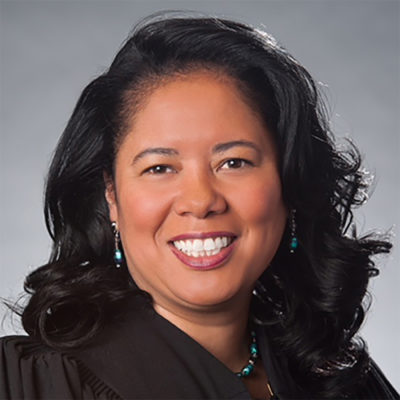
Biden nominates Angel Kelley for the United States District Court for the District of Massachusetts. Ms. Kelley has served as an Associate Judge on the Massachusetts state court since 2009, with an initial appointment to the District Court then appointed to the Superior Court in 2013. During her term as a Superior Court Judge, she held a leadership position as the Regional Administrative Judge on the Massachusetts Superior Court from 2017 to 2020.

Biden nominates Karen M. Williams for the United States District Court for the District of New Jersey. Ms. Williams has served as a U.S. Magistrate Judge for the U.S. District Court in the District of New Jersey since 2009. Ms. Williams also currently serves as an adjunct professor at Rowan University in Glassboro, New Jersey.
Donor vs. Diversity test: During his campaign, President Biden promised to appoint ambassadors who reflected the diversity of America. However, as President Biden looks to focus on the 80 ambassador positions he has left to fill, Voice of America News reports that he will have to balance his campaign promise to appoint ambassadors of color with acknowledging the contributions of top donors.
Economic Policy
Mortgage payment catch-up: Black homeowners are having a harder time catching up on missed mortgage payments than other homeowners. In mid-April, 11 percent of Black homeowners were still in forbearance, more than double the rate of white borrowers. Homeowners were allowed to pause their mortgage payments under a federal forbearance program, and although the share of Black homeowners in forbearance declined 35 percent between June 2020 and mid-April 2021, the decline among all homeowners was 43 percent.
Wage declines: The racial wage gap increased in the first quarter of 2021, as earnings for Black workers declined by 1.4 percent from the fourth quarter of 2020 while other workers’ wages rebounded to pre-pandemic levels. Black workers earn 70 percent as much as white workers, the largest racial wage gap since the beginning of the pandemic.
Unemployment not over yet: Despite anecdotal accounts of labor shortages in some industries, unemployment remains widespread, especially among Black and other people of color. The unemployment rate in April was 9.7 percent for Black workers but just 5.3 percent for white workers.
Leverage federal money wisely: States and localities should use American Rescue Plan funds to dismantle racial and other inequities and leverage state revenue systems for long-term investment in Black and other communities most impacted by the COVID-19 pandemic, argues the Center on Budget and Policy Priorities.
Working moms are worried: Working mothers doubt they’ll gain equal pay and are anxious about keeping up with bills and balancing the demands of work and family, a new survey reveals. Four of five Black mothers (79 percent) are breadwinners—far more than any other group—and a majority (56 percent) are raising families on their own.
States modify their EITC: Several states made changes to the Earned Income Tax Credit, including Washington (which created a Working Families tax rebate modeled after the federal EITC) and Indiana (where lawmakers increased EITC from 9 percent to 10 percent). Hawaii, however, failed to extend its EITC, which is set to expire at the end of 2022.
Tech Policy
Disinformation discussions: This week Aspen Digital of the Aspen Institute interviewed Olivier Sylvain, Professor of Law at Fordham University to discuss ad-targeting, algorithms, and marginalized communities. This discussion is part of expert briefings on mis- and disinformation hosted by the Aspen Institute in tandem with their Commission on Information Disorder. Last year, the Joint Center convened experts, including Sylvain, Congresswoman Yvette Clarke (D-NY), and Congressman Mike Doyle (D-PA), to debate Section 230 reform.
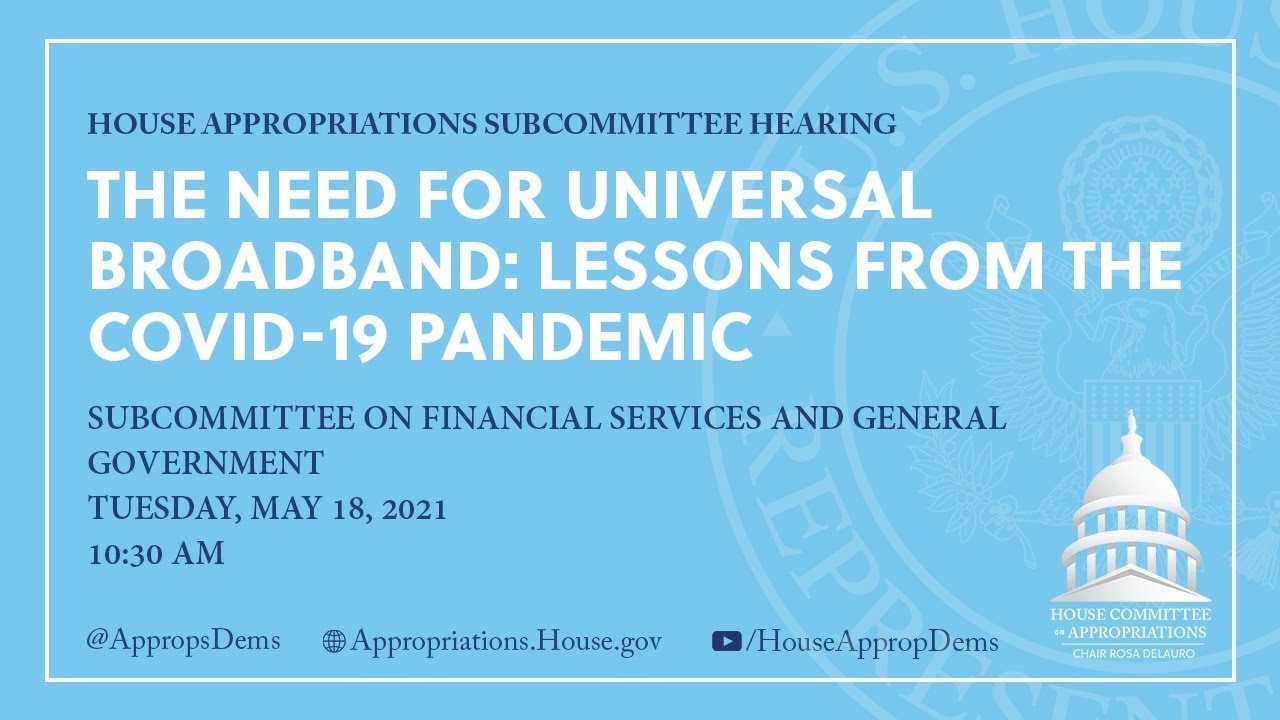
Appropriations hearing on broadband: The House Appropriations Subcommittee on Financial Services and General Government just announced a hearing on broadband, “The Need for Universal Broadband: Lessons from the COVID-19 Pandemic.” Witnesses for the hearing include Joi Chaney of National Urban League, Matt Dunne of Center on Rural Innovation, and Max Stier of Partnership for Public Service. Early this year, the National Urban League unveiled the Lewis Latimer Plan for Digital Equity and Inclusion.
Ways and Means hear from broadband experts: In a testimony before the Ways and Means Subcommittee on Trade, Brookings Director of the Center for Technology Innovation Dr. Nicol Turner-Lee called for the equal deployment of digital infrastructure and more training and resources to make broadband readily available.
Data privacy needs federal protection: The patchwork of data privacy legislation in more than 20 states falls far short of what is truly needed, a federal data privacy law, argues a founder of a privacy company. The growing market for information has raised critical questions about protecting the privacy of individuals. For many advocates, privacy is a civil rights issue, and harmful data practices disproportionately harm marginalized communities.
Tech hearings were beneficial: Congressional hearings with major tech companies, including Google and Facebook, accomplished several worthwhile objectives, including more transparency in algorithms. Congress has used recent tech hearings as a “bully pulpit to force companies to self-regulate.” However, the question of the role of government in regulating Big Tech to prevent harm and bias still remains.
Broadband brings jobs: Broadband access for all Americans is critical to advancing opportunities in underserved communities and driving economic growth. Deloitte’s research shows that a 10 percentage point increase in broadband penetration in 2016 would have produced 806,000 new jobs in 2019.
HBCUs get tech investments: The Pentagon is creating Centers of Excellence focused on new technologies at two HBCUs: Howard University and Delaware State University. Howard’s center will focus on artificial intelligence in machine learning, and Delaware State will focus on quantum sensing.
FCC refunds schools: Jessica Rosenworcel, acting chair of the FCC, issued a draft order for $7.1 billion through the Emergency Connectivity Fund to reimburse schools for devices and broadband connections they purchased during the COVID-19 pandemic. On Monday the FCC unanimously approved the final rules to implement the program. FCC Commissioner Geoffrey Starks issued a statement on the Fund, including sharing his idea to add questions to the funding application in order to understand where the Homework Gap is and how wide the gap is.
Redirect digital grants in rural areas: Citing “pervasive errors in broadband data,” an industry association of wireless providers and stakeholders called on the FCC to redirect Rural Digital Opportunity Fund grants from wealthy, densely populated areas to underserved rural areas. The deployment of faster, quality broadband in concentrated higher-income areas—also known as “digital redlining”— can promote economic and racial discrimination.
Overhaul machine learning: Machine learning scholars must critically re-examine the field and bring an ethical lens to algorithmic injustice. Abeba Birhane, Cognitive Science Ph.D. Candidate in the School of Computer Science at University College Dublin, argues that research on algorithmic injustice must examine unquestioned or intuitive assumptions in datasets, current and historical injustices, and power asymmetries.
Future of Work & Learning
Accountability 101: The Education Trust lists five questions stakeholders should ask local school districts about how they will use $109 billion in federal education funding from the American Rescue Plan. On the list, districts must focus on closing opportunity gaps for Black and other students of color and low-income students.
COVID-19
Joining forces: The Department of Health and Human Services and the Department of Housing and Urban Development will work jointly to deliver COVID-19 vaccines to vulnerable families in multifamily housing, public housing properties, and homeless shelters.
Closing the vaccine gap: Community health centers emerged as leading providers of coronavirus vaccines in vulnerable Black communities, helping to close racial disparities in vaccination rates. The CDC reports that 67 percent of fully vaccinated people are white (whites make up 61 percent of the U.S. population) but only 9 percent are Black (who make up 12 percent of the U.S. population). Of those vaccinated by Neighborhood Health in Washington, D.C., 24 percent are Black and 15 percent are white.
Invisible Black LGBTQ communities: A lack of data on sexual orientation or gender identity among the vaccinated makes it difficult to document disparities in the LGBTQ community. Inequities may be more pronounced among Black LGBTQ people, who have a greater distrust of healthcare providers.
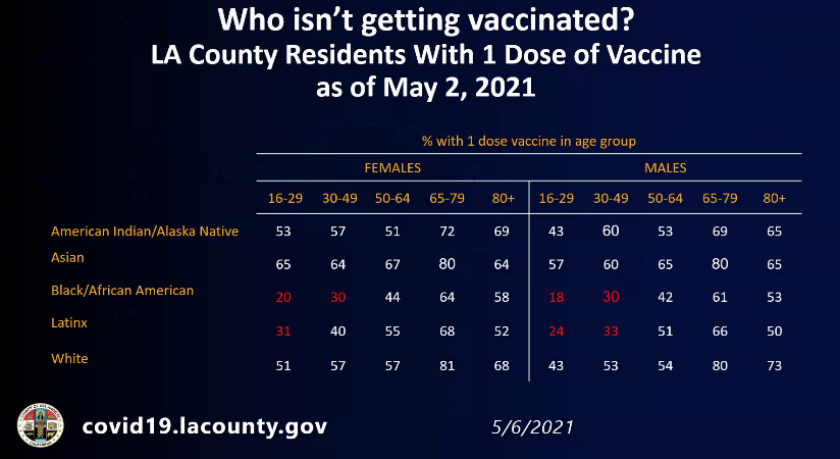
Black Gen Zs opt out: Young Black Angelenos have some of the lowest rates of COVID-19 vaccinations. Only 18 percent of Black men and 20 percent of Black women from 16 to 29 years old in Los Angeles County have received at least one dose of the vaccine in comparison to 43 percent of white men and 51 percent of white women in the same age group.
Vaccine eligibility expands to young adolescents: Children between the ages of 12 to 15 can now receive the Pfizer vaccine, declares the Food and Drug Administration (FDA). The expansion could be critical in allowing kids to safely return to in-person school. A December 2020 McKinsey study found that “Black and Hispanic students continue to be more likely to remain remote and are less likely to have access to the prerequisites of learning—devices, internet access, and live contact with teachers.” The findings further stated that “students of color could be six to 12 months behind, compared with four to eight months for white students” in mathematics by June 2021.
Political Studies
Florida restricts votes: Florida Governor Ron DeSantis (R) signed a voting bill limiting access to mail-in voting and imposing stricter ID requirements, among other measures. The law was immediately challenged by civil rights groups, including by the NAACP Legal Defense and Educational Fund, whose lawsuit charges that the law disproportionately affects the ability of Black residents to vote.
Black CEOs elevate voting rights: A pair of top Black corporate leaders—former American Express CEO Ken Chenault and Merck CEO Ken Frazier—are credited with making voting rights a priority in corporate America.
AG stops voter interference: New York Attorney General Letitia James filed a legal motion against two right-wing operatives after emails revealed their explicit plans to target Black communities with robocalls discouraging mail-in voting.
Movement Building
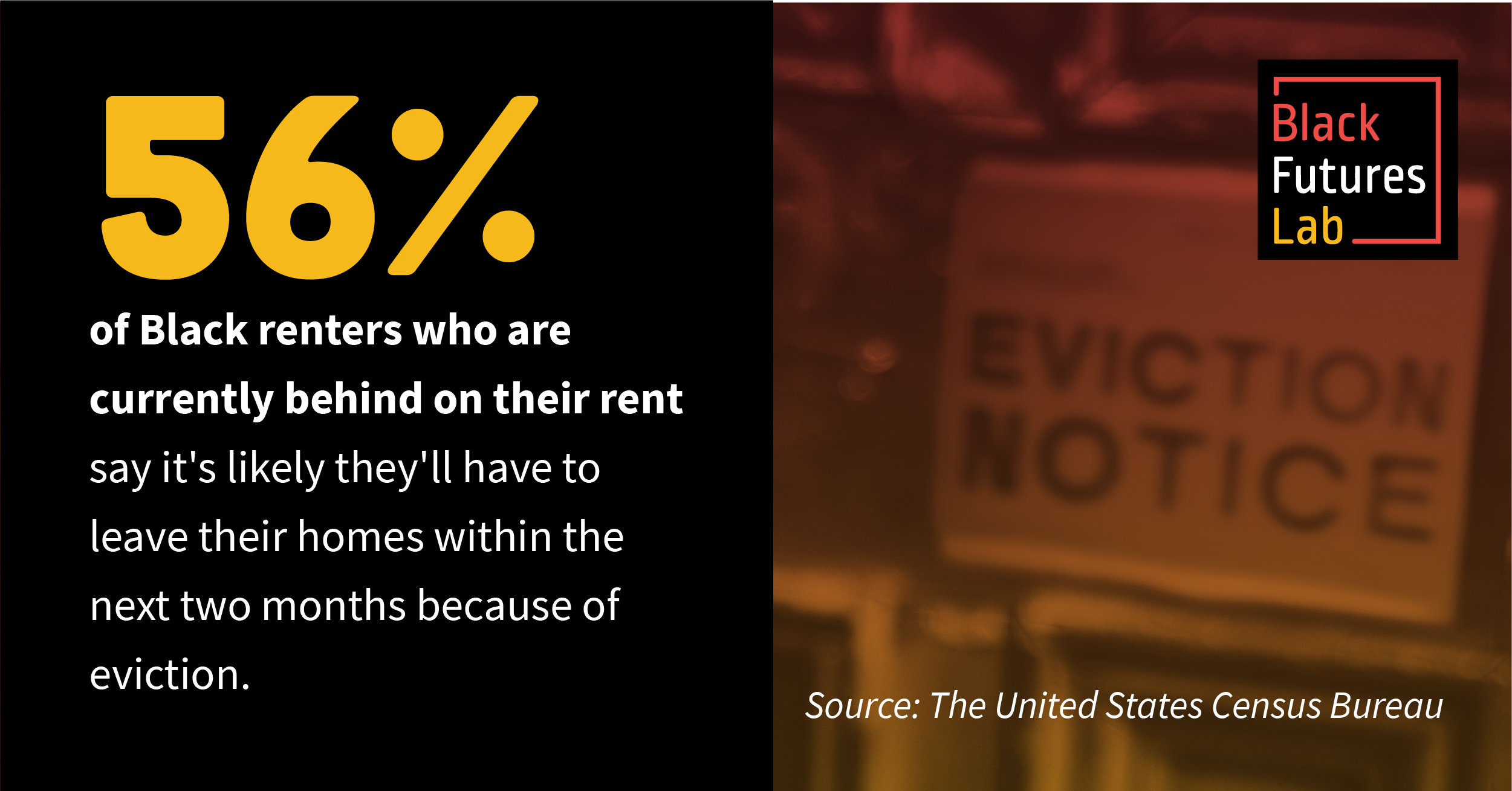
Black Futures Lab shares the potential impact the overturn on the CDCs eviction moratorium has on the 56% of Black renters currently behind on their rent.
Color of Change issues a petition to Mayor G.T. Bynu, the 1921 Tulsa Race Riot Centennial Commission, and the City of Tulsa to provide reparations to the survivors and descendants of the 1921 Tulsa Race Riot Massacre.
National Bail Out raises funds on Mother’s Day to free incarcerated Black mothers and caregivers from systems of incarceration.
New American Dream hosts a five-week series of virtual forums to discuss white supremacy and structural racism in America and explore how policy and culture can become more accountable to “its democractic ideals.”
Events
Upcoming events include “REMI Diversity, Equity and Inclusion” (REMI, May 14) and “The State of Apprenticeship during the COVID-19 Pandemic: Reports from Seven Countries” (Urban Institute, May 26).
PUSHTech goes virtual: The sixth annual PUSHTech Diversity and Inclusion Summit on May 12-14 will be virtual.
Last week, events were held by the Brookings Institution, Politico, and The Hunt Institute.
Podcast
A new vision for American infrastructure (Brookings Institution)
The Joint Center thanks the Annie E. Casey Foundation, the Boulé Foundation, the Democracy Fund, Toyota Motor North America, Inc., UPS, and the Walmart Foundation for additional support that has allowed us to do some of our COVID-19 and Black Communities work.
To receive the Joint Center’s emails, sign-up here.

